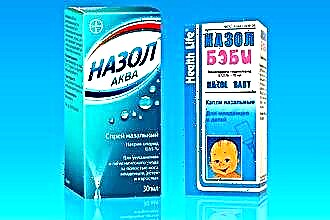If a cough occurs during pregnancy, how to treat it should be decided solely by the doctor. Airway spasm is not an independent disease, it is a symptom of various kinds of disorders in the body. The therapy should be completely safe for the expectant mother and fetus. It is for this reason that the list of drugs allowed for use will be very narrow. Potent drugs may be prescribed, information about the use of which during gestation is not enough, but this is done only in exceptional cases, when the benefit for the woman will be greater than harm for the unborn child.
Danger of spasm
 Pregnant women should never be allowed to take cough treatment on their own. The spasm itself can provoke serious violations, in addition, if it is not eliminated, then the spread of the infection in the body can be allowed. This is dangerous both for the mother herself and for her unborn baby. If in the 1st trimester pathogens penetrate through the not yet fully formed placenta, then pathologies of fetal development are possible.
Pregnant women should never be allowed to take cough treatment on their own. The spasm itself can provoke serious violations, in addition, if it is not eliminated, then the spread of the infection in the body can be allowed. This is dangerous both for the mother herself and for her unborn baby. If in the 1st trimester pathogens penetrate through the not yet fully formed placenta, then pathologies of fetal development are possible.
Also, a cough and its causes can provoke such unwanted violations:
- detachment of the placenta;
- premature resolution of pregnancy;
- miscarriage;
- development of intrauterine infection;
- uterine bleeding.
When coughing, blood pressure rises, which is unsafe for the fetus and the expectant mother. Also, there is a strong muscle tension, the tone of the uterus increases. This condition is especially dangerous in the early stages of pregnancy, as it can lead to its failure.
It is imperative to eliminate the spasm, it is also important to find out and eliminate its root cause so that the child is born healthy and on time.
Treatment selection factors
Only a doctor can choose the right treatment for a pregnant woman. Any independent manipulations are prohibited, since even the most harmless medicines and traditional medicine methods can negatively affect the health of the woman and the fetus. When choosing a safe and effective therapy, the following factors are taken into account:
- period of gestation;
- the general condition of the patient;
- the cause of the disease and its history;
- the presence of personal intolerance;
- the type of cough itself (productive or unproductive);
- the frequency of the onset of the cough reflex;
- the nature and type of sputum;
- the presence of concomitant acute and chronic diseases.
Varieties of funds
The attending physician prescribes only harmless drugs for the pregnant woman. They can be made on the basis of natural ingredients. Most often, expectant mothers are prescribed syrups and tablets with extracts of marshmallow, licorice, plantain.
It is also allowed to take some synthetic drugs, but only if the benefits are greater than harm.
 The form of release of drugs can be different:
The form of release of drugs can be different:
- lozenges and lozenges for sucking;
- solutions for inhalation;
- pills;
- potions and syrups;
- sprays.
Drugs that can dilute the sputum, make it less viscous, are called mucolytics. There are also drugs that can stimulate the excretion of secretions secreted by the bronchi (expectorants).
Medicines are also used to help eliminate an unproductive unproductive cough. They are called antitussives, they are prescribed especially carefully for pregnant women, since they have many contraindications and cause side effects. The cough reflex is suppressed by "lulling" the work of the cough center in the brain or the receptors of the respiratory system.
Help in the 1st trimester
A woman and a fetus in the 1st trimester of pregnancy are especially vulnerable. In the body of the expectant mother, there is a complete restructuring of all organs and organ systems, her immunity is weakening, since it works not for one "owner", but for two. The future baby at this time turns from an egg into a full-fledged embryo, all its systems are actively developing.
 The placenta is not yet very strong, it can pass pathogenic microorganisms and harmful substances. It is for this reason that in the 1st trimester it is advisable not to encounter any diseases at all, they can harm both mother and child.
The placenta is not yet very strong, it can pass pathogenic microorganisms and harmful substances. It is for this reason that in the 1st trimester it is advisable not to encounter any diseases at all, they can harm both mother and child.
If it was not possible to avoid infection or hypothermia, you can cure the cough with the help of drugs that are completely safe for health. They do not have an aggressive effect on the body of a woman and a fetus. Topical medications are best.
Keep in mind, however, that lozenges and lozenges that fall into this category contain chemicals that can be harmful to your health. Consider effective and safe remedies for the 1st trimester of pregnancy.
| Name | Origin | Peculiarities |
|---|---|---|
| "Mukaltin" | Herbal tablets are made on the basis of marshmallow root. | Cough tablets during pregnancy do not give any side effects, they are used freely. |
| Marshmallow root syrup | Completely natural preparation, the main active ingredient is marshmallow root extract. | Cough syrup during pregnancy is often prescribed as it does not cause side effects. |
| "Pulsatilla" | Homeopathic remedy. | No side effects, it is used freely from the first trimester of pregnancy. |
| Stodal | Homeopathic cough remedy. | It has no contraindications during pregnancy, it is used freely. |
| "Broncho-gran" | Homeopathic remedy, completely safe to use. | It is used for treatment in the 1st trimester without fears for the health of the expectant mother and fetus. |
| "Bifidophilus flora force" | The tool belongs to dietary supplements, has a tonic effect. | It is used without fear in the 1st trimester, it is contraindicated only in case of personal intolerance to the components. |
| "Doctor Mom" | An herbal remedy for dry cough. | It is used for treatment in the first trimester of pregnancy, but there is insufficient data on the effect on the fetus. |
| "Gedelix" | Herbal preparation, prescribed for the treatment of dry cough. | There is no reliable data on the effect of the drug on the fetus, therefore it is used only in agreement with the doctor. |
| "Bronchicum" | A product based on herbal ingredients. | There is no fundamental research on the use during gestation, but the remedy is used in practice if the risk is justified by the benefits for the expectant mother. |
| "Libeksin" | A synthetic drug with a lot of contraindications. | It is used only in extreme cases, when the benefit to the mother outweighs the harm to the fetus. |
| "Doctor Theiss" | Herbal remedy for productive cough. | It is used without fear, has a minimum of contraindications. |
| "Pregnacare" | Effective food supplement (BAA). | It is indicated for use during the entire pregnancy, as it does not have a negative effect on the fetus. |
| "Mamavit" | Food supplement (BAA). | It does not have a negative effect on the fetus, it is freely used during pregnancy. |
| "Bronchipret" | Herbal remedy for wet cough. | There is not enough data on the use during pregnancy, it is prescribed, but with caution. |
Treatment during the 2nd and 3rd trimester
From the third month of pregnancy, more serious cough remedies can be taken. The list of synthetic drugs is expanding, since the placenta is already dense enough and does not allow harmful substances to pass to the fetus, all its main organs and organ systems have already been formed.
However, it should be borne in mind that the future baby continues to develop actively, so as not to disrupt this process, you need to choose only safe drugs.
The following are added to the medicines allowed in the first trimester:
| Name | Origin | Peculiarities |
|---|---|---|
| "Akodin" | Synthetic preparation for dry cough. | It is used only in cases where the possible risk to the fetus is justified by the benefit to the mother. |
| "Bromhexin" | A synthetic medicine with a complex effect for an unproductive cough. | Used in extreme cases when the health of the mother is more important than the health of the fetus. |
| "Stopussin" | Antitussive drug on a synthetic basis. | It is prescribed extremely rarely, only after assessing all the possible risks and benefits. |
| "Ambroxol" | A drug of synthetic origin, which helps in the treatment of productive cough. | It has many contraindications, it is prescribed only in advanced cases. |
| "Fluifort" | Synthetic medicine for wet cough. | Use during pregnancy is allowed only when the drug brings more benefits to the mother than harm to the fetus. |
Other methods
Inhalation is considered to be the most effective treatment for cough at different stages of pregnancy. First of all, they help to quickly relieve symptoms and get rid of coughs. Medicinal components that are mixed with steam have a targeted effect, they go directly to the focus of infection or inflammation and actively fight against pathogens.
Also, the advantages of the procedures include the fact that the solutions act only on the mucous membrane, without being absorbed into the bloodstream, they cannot negatively affect the development of the fetus.
Inhalation can be done using special nebulizer devices; solutions are sold for them in pharmacies. Using different mechanisms, depending on the model of the device, the drug is sprayed into microparticles and delivered directly to the respiratory tract.
However, if this is not possible, you can also use a simple teapot, through the spout of which you need to inhale healing agents. For their preparation, the following recipes are used:
 Soda solution. Effectively disinfects, relieves inflammation and soothes irritated mucous membranes. To prepare the product, you need to take half a teaspoon of baking soda and pour a glass of boiling water, when the mixture cools down to 40 ° C, start inhaling it through your mouth for 10 minutes.
Soda solution. Effectively disinfects, relieves inflammation and soothes irritated mucous membranes. To prepare the product, you need to take half a teaspoon of baking soda and pour a glass of boiling water, when the mixture cools down to 40 ° C, start inhaling it through your mouth for 10 minutes.- Honey solution. To prepare a powerful cough suppressant, we need 50 ml of liquid natural honey and a glass of boiled water, the temperature of which is not more than 60 ° C. Stir the components well to get a homogeneous mass, wait until the solution cools down to a comfortable temperature, inhale through the mouth for 10 minutes.
- Plantain infusion. Take a tablespoon of dried plantain herb leaves, brew with boiling water (1 cup). Let it cool to 40 ° C and inhale the vapors for 10 minutes.
You can also gargle for pregnant women, this will help eliminate cough. However, it should be borne in mind that in the first trimester with pronounced toxicosis, it is impossible to use funds that provoke the gag reflex.
Baking soda and some other medicinal infusions can only be used from the second trimester. Effective for spasm of the respiratory tract will be such remedies as flowers of a pharmacy chamomile, linden, plantain herb.
Precautionary measures
 There are medicines and natural ingredients that are strictly prohibited during gestation. They contain active substances that can harm both a pregnant woman and her unborn child. You can not take pharmaceuticals that affect the activity of the respiratory center, raise blood pressure, thin the blood, stimulate the tone of the uterus, contain alcohol or drugs.
There are medicines and natural ingredients that are strictly prohibited during gestation. They contain active substances that can harm both a pregnant woman and her unborn child. You can not take pharmaceuticals that affect the activity of the respiratory center, raise blood pressure, thin the blood, stimulate the tone of the uterus, contain alcohol or drugs.
Among the plants prohibited for use are tinctures of ginseng, eleutherococcus, echinacea. A plant such as St. John's wort has a negative effect. It reduces the effectiveness of pain relievers and can even interfere with the properties of anesthesia for a caesarean section.
Comfrey officinalis and coltsfoot are dangerous for the unborn baby, they lead to gene mutations and act as carcinogens. A component of many cough medicines such as ginkgo biloba contributes to the decrease in blood clotting and the opening of uterine bleeding. Be careful when choosing folk remedies, trust it only to a doctor.
In conclusion
Treatment of cough in pregnant women occurs according to different schemes. Only a doctor can prescribe medications and procedures to eliminate diseases and symptoms, since most drugs are prohibited from use during gestation. However, even with the help of drugs that are harmless to the mother and her future baby, you can achieve a quick recovery if you start therapy on time. Take care of yourself and seek qualified help in time.

 Soda solution. Effectively disinfects, relieves inflammation and soothes irritated mucous membranes. To prepare the product, you need to take half a teaspoon of baking soda and pour a glass of boiling water, when the mixture cools down to 40 ° C, start inhaling it through your mouth for 10 minutes.
Soda solution. Effectively disinfects, relieves inflammation and soothes irritated mucous membranes. To prepare the product, you need to take half a teaspoon of baking soda and pour a glass of boiling water, when the mixture cools down to 40 ° C, start inhaling it through your mouth for 10 minutes.

